Project Background
“Physical Education is just for playing, nothing but a waste of time”, “Physical Education is only for nurturing and finding the elite of athletes.” I had heard the words above from several teachers in primary schools in Uganda.
The Republic of Uganda (Uganda) is one of the nations wherein primary schools, subjects such as P.E., music, and art are not valued as math, English, or other major subjects. Especially in P.E., the main objective is to only enhance the competitiveness within students. The reasons include the “diplomaism” that lies within the education system, which encourages schools to ignore subjects that cannot be assessed through examinations, such as P.E. Also it can be said that P.E. teachers in general lack experience in teaching and learning P.E. themselves. This project was initiated to overcome these issues, to support teachers to conduct P.E. lessons with a deep understanding of the value and possibility it holds in education.
Activities and Achievements
There are two main projects.
1. Development of teaching guidelines for primary school teachers
We found that it was difficult for teachers to develop lessons based on the current curriculum for the following reasons: 1) the content does not consider the school environment and is impossible to conduct, 2) the assessment leans too much on skills, 3) objectives and activities are described only in words, 4) majority of teachers lack in teaching/learning P.E themselves. In order to improve this situation, Ugandan and Japanese teachers are collaborating to develop teaching guidelines that can be easily implemented in P.E. lessons. The materials were developed based on the Ugandan curriculum (on the topic of Netball) and aim to improve the following points.
・ Add descriptions on the significance and content of P.E.
・ Add detailed descriptions on the four skills in objective and assessment in aspect of Value (Assertiveness), Life skill(Effective communication & Critical thinking), Subject competence (Physical movement), and Linguistic competences.
・ Propose activities and lesson tools suitable for the development stage of students in each grade.
・ Explain the rules of the activities in a way that is easy to understand, by using illustrations.
・ Indicate detailed activities for the hour, of both teachers and students.
・ Develop lesson plans that allow the students to acquire the four skills in a balanced manner.
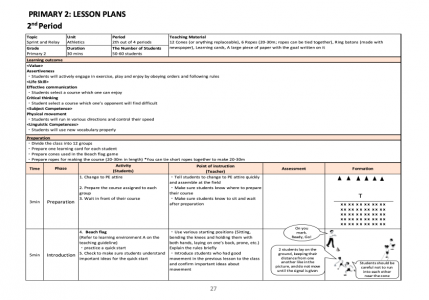
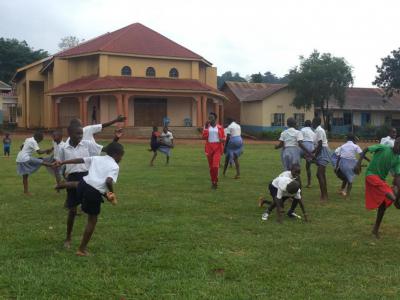
Pic. in left: Lesson Plan in Track and Field. Pic. in right: Lesson based on the workshop.
2. Training on instructing P.E.: Local Workshops and Training in Japan on Lesson Instructions
Along with developing teaching guidelines we have also been conducting workshops in Uganda and Japan. In Uganda, the training focused on acquiring knowledge and experience of the significance of P.E. and lesson pedagogy. The participants of this training were teachers/supervisors of teaching colleges, and teachers from pilot schools and surrounding schools, of which they were selected from three districts that are neighboring the capital. We also invited P.E. teachers from pilot schools and teacher training colleges to Japan, where they observed and experienced Japanese P.E. lessons. This became the opportunity for the participants to not only change their conceptions towards P.E., but also to identify the difference of P.E. lessons between Japan and Uganda, and consider the positive aspect and points for improvement from an objective point of view. The participants asked many questions, and they were very keen on understanding the instruction methods and activities within the lesson. In the simulation activity after the training participants showed much improvement, by applying what they learned through lectures and lesson observation, and were able to adopt the four skills shown in the curriculum to the lesson. Even after returning to their own countries the participants are developing syllabi and lesson plans and maintaining their motivation.
*Net Ball: A sport created in 1895 England. 1 game consists of two teams (7 members per team), and the players must pass around the ball without dribbling and shoot it into the goal ring, without moving out from the area dedicated to each player. A team can obtain 1 score from each goal, and whichever team with the higher score at the end of the game wins.
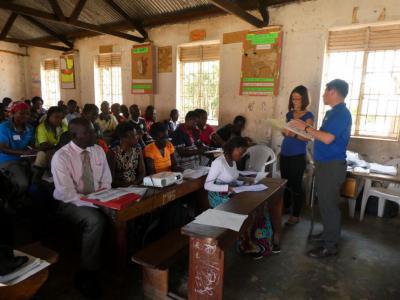
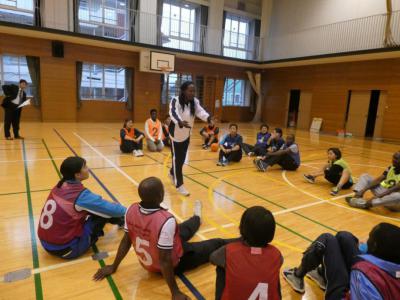
Pic. in left: P.E. Workshop conducted in Luweero District
Pic. in right: Training conducted in Japan. (Lesson demonstration in basketball)
Strong points of Japanese Education that us Japanese do not notice, and what we learned in Uganda
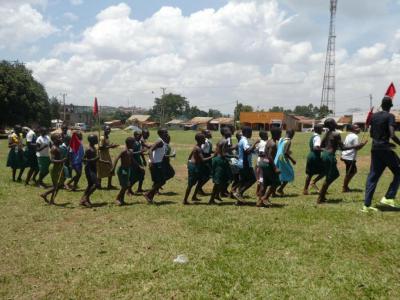
Students marching into the field while singing.
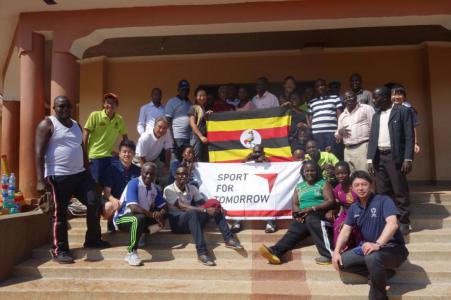
Group photo after the workshop in Japan
Like how Ugandan teachers had their own conceptions towards P.E., we also imagine that “All African children are good at sports”. Through this project, we realized that even children in Africa can not do anything that they have not learned in class.
When we saw the Ugandan children run towards the field with excitement and bright smiles, we could feel the amount of energy that we have never experienced in Japan. The children seem to appreciate the time they spend actively, instead of their usual lectures in the classroom. This also shows that the Japanese style P.E. brings the same benefits to children’s learning, no matter where the country is.
Japanese P.E. tries to deliver lessons that “Every student can participate/Students can learn from each other”, and it seemed that Ugandan teachers were fascinated with our values, where we try to nurture social and cognitive skills instead of only focusing on raising competitiveness. The teachers who participated in the project spoke highly of Japanese teachers, and gain practical experience to follow in their footsteps.
Future Prospects
Schools had been closed since the COVID-19 pandemic, but they are planning to reopen on October 15th. Unfortunately, it will not be possible to visit Uganda for some time, so we need to drive the project forward in Japan while maintaining the motivation of teachers in Uganda. That is why we will focus on the following 4 points.
① Developing teaching guidelines for netball, and creating video content that explains the usage of the materials.
② Follow-ups of lesson practices of teachers.
③ Organize sessions for presenting practices.
④ Supporting dissemination of activities.
With the support of primary schools in Japan, we are developing video content that explains the usage of the teaching guideline. This will support the teachers in Uganda in understanding the materials better and implementing them in lessons. We also provide continuous support by giving advice after listening to their feedback on the conducted lessons. If possible we are planning to organize a session for presenting lesson practices with all teachers from Japan and Uganda who are part of the project. Finally, we plan to continuously support teachers and other educational institutions, in order to sustain what we have accomplished through this project.







